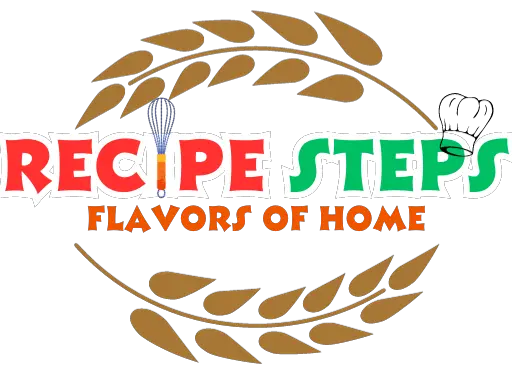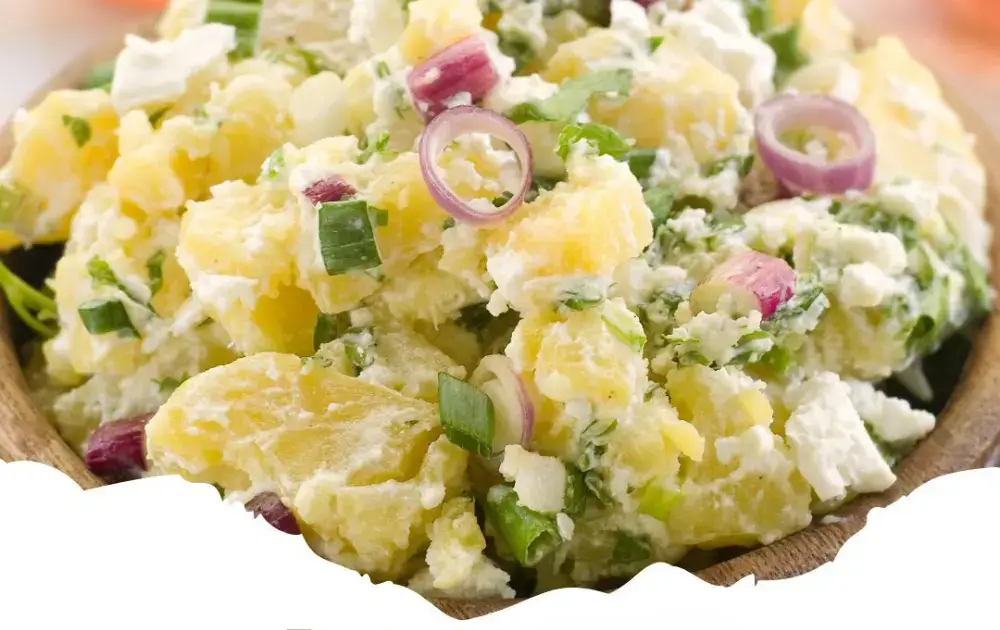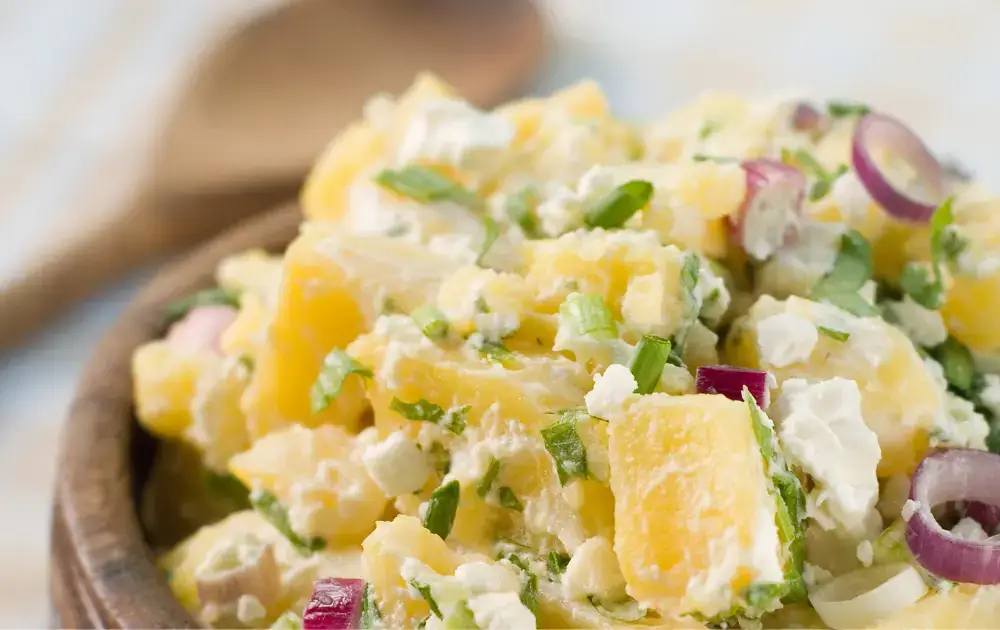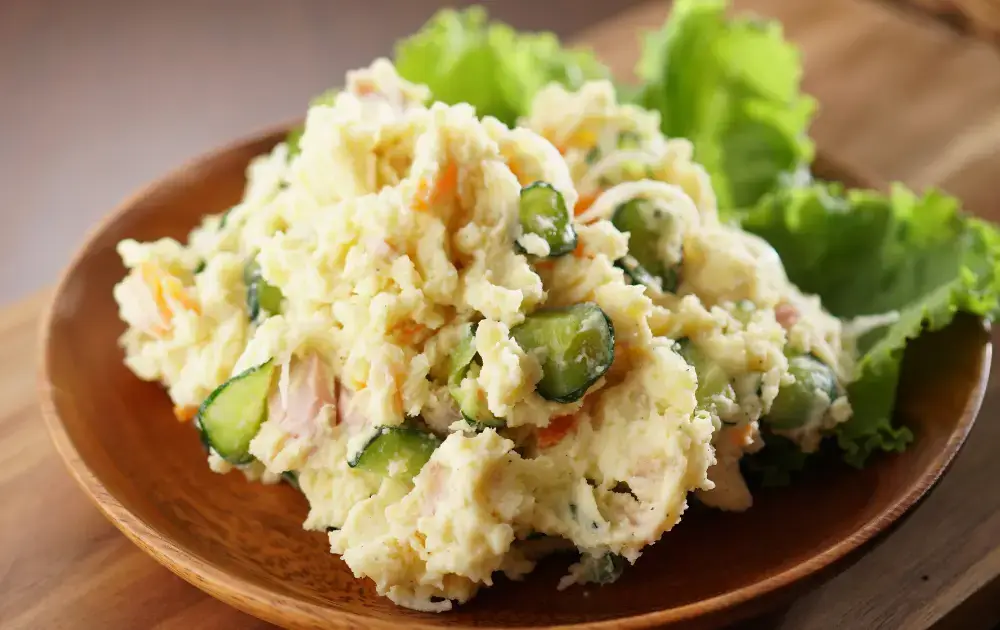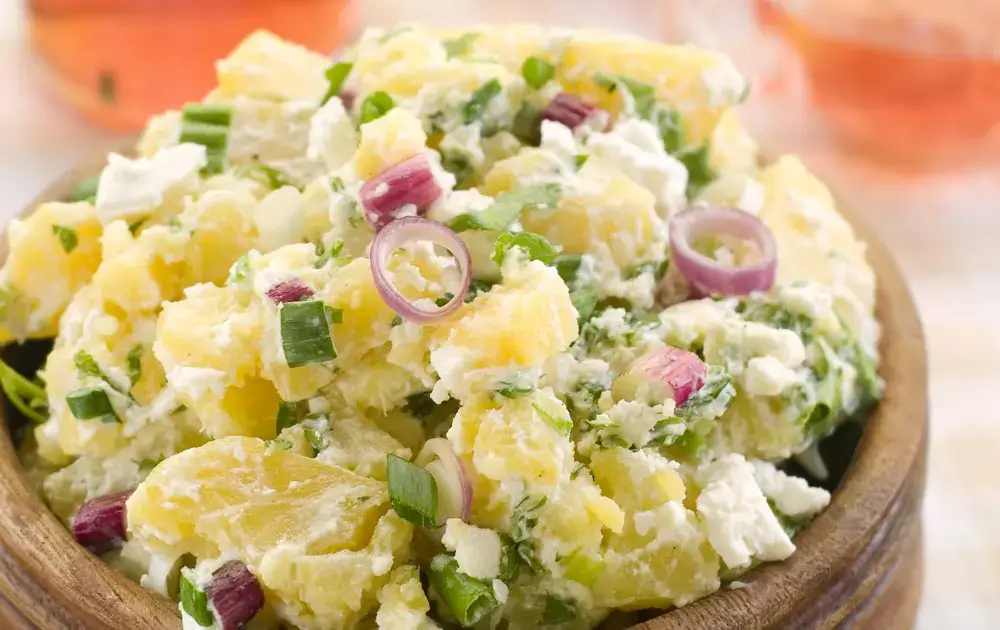Potato salad, a dish made primarily of potatoes, stands out as a versatile and popular side dish enjoyed by many. Its origins trace back to Europe, but over the years, it has found its way into the culinary traditions of various cultures worldwide, each adding its unique twist to the recipe.
The Basic Ingredients and Variations
At its core, potato salad typically includes boiled potatoes, which chefs then mix with a variety of ingredients such as mayonnaise, mustard, onions, herbs, and spices to enhance its flavor. The type of potato used can vary, with some recipes calling for waxy potatoes for their ability to hold shape, while others prefer starchy potatoes for a creamier texture. The choice of additional ingredients often reflects regional preferences and traditions, leading to a wide range of variations from creamy American potato salad to tangy German potato salad, which uses vinegar instead of mayonnaise.
Preparation Techniques
The preparation of this salad involves boiling the potatoes until they are just tender, a crucial step to ensure they maintain their shape and do not become too mushy. After cooling, the potatoes are then cut into cubes or slices and mixed with the other ingredients. The dressing, whether it is mayonnaise-based or vinegar-based, is key to binding all the components together and adding moisture to the dish. Some recipes also include the addition of hard-boiled eggs, bacon, or pickles for extra texture and flavor.
Serving and Consumption
Potato salad is typically served cold, making it a refreshing choice for picnics, barbecues, and other outdoor events, especially during the warmer months. However, some variations, like the German potato salad, are served warm, offering a comforting side dish option during colder seasons. It pairs well with a variety of main dishes, from grilled meats to sandwiches, making it a versatile addition to any meal.
Cultural Significance and Personalization
The adaptability of potato salad allows it to reflect the cultural tastes and preferences of different regions, making it a unique dish that tells a story of its origins and the people who make it. Home cooks and chefs alike enjoy experimenting with the recipe, adding their personal touch with ingredients that hold special meaning or cater to their taste preferences. This personalization has led to an endless variety of potato salad recipes, each with its own identity and flavor profile.
Nutritional Profile and Health Considerations
Potato salad contributes a mix of nutrients, including carbohydrates from the potatoes, which provide energy, and various vitamins and minerals from the added vegetables and eggs. The dish’s nutritional value, however, largely depends on the choice of ingredients and dressing. Mayonnaise-based dressings, for instance, can add significant amounts of fat and calories, whereas vinegar-based dressings offer a lighter alternative. Adding vegetables like celery, onions, and peppers can enhance the salad’s vitamin, mineral, and fiber content, making it a more balanced and healthful option.
Innovative Twists and Dietary Adaptations
Culinary enthusiasts and chefs continuously experiment with potatos salad recipes to cater to diverse dietary preferences and health trends. For those following plant-based diets, substituting traditional mayonnaise with vegan alternatives or using avocado for creaminess offers a way to enjoy salad without animal products. Low-carb versions replace potatoes with cauliflower, appealing to those on ketogenic or similar diets. The introduction of herbs, spices, and unconventional ingredients like fruit or nuts introduces new flavors and textures, broadening the dish’s appeal.
Cultural Celebrations and Potato Salad
This salad often features prominently in cultural festivities and family gatherings, symbolizing more than just a side dish. In some cultures, specific potato salad recipes are traditional for holidays or celebrations, acting as a nostalgic reminder of family history and communal ties. The dish’s versatility means that it can adapt to fit any occasion, from casual barbecues to formal dinners, making it a staple in celebratory feasts around the world.
The Social Aspect of Potato Salad
Sharing salad at gatherings is not only a culinary tradition but also a social one. It serves as a conversation starter and a means of connection, allowing people to share their personal recipes and the stories behind them. Potluck dinners, where guests bring their own dishes to share, often feature a variety of potato salads, each reflecting the personal taste and cultural background of its maker. This diversity showcases the dish’s universal appeal and its ability to bring people together over a shared love of food.
Future Trends in Potato Salad
As culinary trends evolve, so too does the concept of potato salad. Chefs and home cooks alike are exploring new ingredients, techniques, and presentations, pushing the boundaries of what potato salad can be. From deconstructed versions that play with texture and form to the incorporation of international ingredients that reflect the global palate, potatos salad continues to evolve. This ongoing innovation ensures that potato salad remains a beloved and dynamic dish in culinary cultures worldwide, constantly adapting to new tastes, dietary needs, and culinary creativity.
Environmental Impact and Sustainable Practices
The production and consumption of salad touch on broader environmental considerations, particularly in terms of ingredient sourcing and waste management. Forward-thinking cooks and consumers now prioritize the use of locally sourced, organic potatoes and ingredients to minimize the environmental footprint. Such practices not only support local economies but also contribute to sustainability by reducing transportation and promoting organic farming methods. Additionally, the choice of eco-friendly packaging for store-bought potatos salad and mindful waste management, including composting of food scraps, reflects a growing awareness of environmental impact.
Technological Advancements in Potato Salad Preparation
Technological advancements have also influenced the preparation and storage of this salad. Modern kitchen appliances, such as pressure cookers and high-speed blenders, have streamlined the cooking process, enabling quicker and more energy-efficient preparation of ingredients. Food preservation technology has extended the shelf life of potato salad without compromising its taste or nutritional value, making it more convenient for consumers. These advancements allow for the enjoyment of potato salads in a manner that suits the fast-paced lifestyle of today’s society while maintaining the essence of this traditional dish.
The Role of Potato Salad in Dietary Education
Potato salad serves as an excellent example in dietary education, illustrating the balance of flavors, textures, and nutrition. Educators and dietitians often use it to teach about food groups, the importance of variety in a diet, and how to make healthier food choices. By modifying the traditional potato salad recipe to include more vegetables, lean proteins, or alternative dressings, individuals learn how to create dishes that are both flavorful and nutritionally balanced. This practical application of dietary principles encourages more mindful eating habits and a deeper appreciation for the food we consume.
Community and Charity Events Featuring Potato Salad
Potato salad often features at community and charity events, underscoring its role in bringing people together for a cause. Whether it’s a community picnic, a charity barbecue, or a fundraising event, potato salad is a popular choice for its ease of preparation in large quantities and its wide appeal. These events highlight the dish’s capacity to serve as a means of community building and engagement. By participating in the preparation and sharing of potato salad, individuals contribute to a collective effort that fosters a sense of belonging and supports charitable causes.
The Enduring Legacy of Potato Salad
The enduring popularity of potato salad lies in its simplicity, versatility, and the comfort it provides. As it continues to evolve with new ingredients, techniques, and cultural influences, potato salad remains a testament to the power of food to adapt, inspire, and bring people together. Its legacy is not just in its taste but in its ability to encapsulate memories, traditions, and the ongoing story of human connectivity through food. As we look to the future, potato salad stands as a symbol of culinary innovation and communal spirit, ever-present at gatherings, celebrations, and everyday meals around the globe.
Frequently Asked Questions About Potato Salad
- What is the best type of potato ? The best type of potato depends on personal preference and the specific recipe. Waxy potatoes like Red Bliss or Fingerling hold their shape well and are ideal for salads where texture is key. For creamier potato salads, starchy potatoes like Russets are a good choice.
- Can it be made in advance? Yes, you can make potato salads in advance. In fact, many people find that the flavors meld and improve when the salad is refrigerated for several hours or overnight. Just be sure to store it in an airtight container in the refrigerator.
- Is potato salad healthy? Potato salad can be part of a healthy diet when prepared with mindful ingredients. Using low-fat mayonnaise or yogurt, adding plenty of vegetables, and serving in moderate portions can make it a healthier option.
- How long does it last in the refrigerator? Properly stored in an airtight container, potato salad can last in the refrigerator for 3 to 5 days. It’s important to keep it chilled and never leave it out at room temperature for more than two hours to prevent foodborne illness.
- Can you freeze it? Freezing potato salads is not recommended. The texture of the potatoes and dressing may become grainy or watery upon thawing, significantly affecting the quality of the salad.
Conclusion
Potato salad, with its rich history and versatility, remains a beloved dish across cultures and cuisines. From its simple beginnings to the myriad of variations that exist today, it embodies the spirit of culinary creativity and tradition. Whether enjoyed at a summer barbecue, a family gathering, or as part of a festive meal, potato salad brings people together, offering comfort, flavors, and memories. As dietary trends and environmental considerations continue to evolve, so too will the ways we prepare and enjoy potato salad, ensuring its place at our tables for generations to come.

Potato Salad
- Total Time: 55 minutes
- Yield: 8 servings
- Diet: Gluten Free
Description
This Apple-Dill Potato Salad is a refreshing take on the classic side dish, incorporating crisp apples and fresh herbs for a unique flavor profile. Perfect for picnics, barbecues, and any gathering that calls for a standout side dish.
Ingredients
Instructions
Notes
- Adjust salt and pepper according to taste.
- Salad can be made ahead and refrigerated to allow flavors to meld.
- Prep Time: 30 minutes
- Cook Time: 25 minutes
- Category: Side Dish
- Method: Boiling
- Cuisine: American
Nutrition
- Calories: 400
- Sugar: 10g
- Fat: 25g
- Carbohydrates: 35g
- Fiber: 4g
- Protein: 10g
